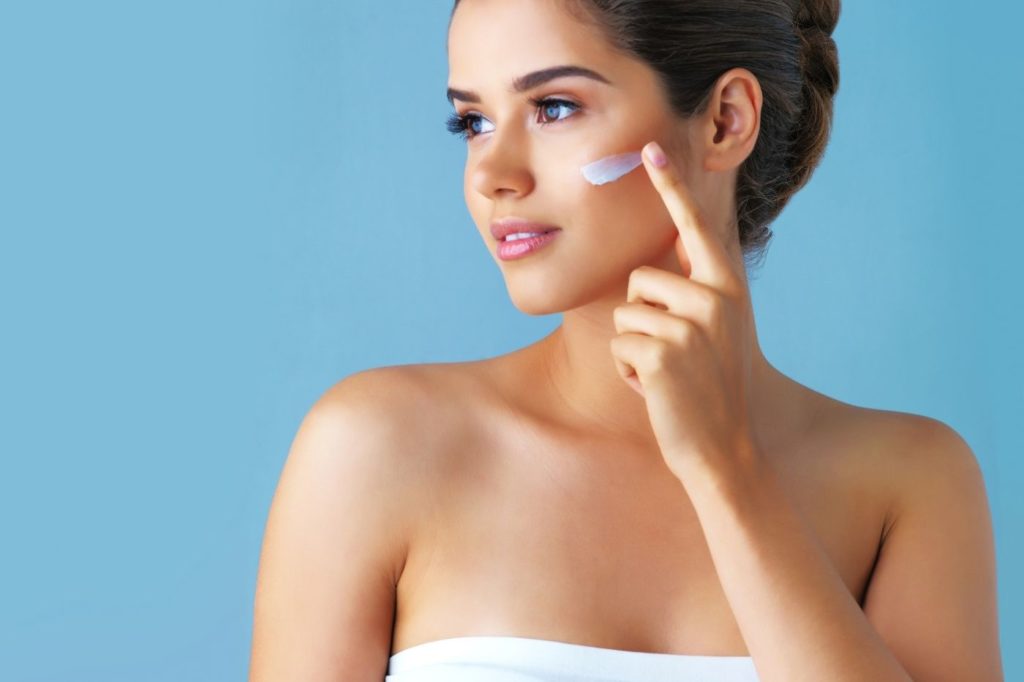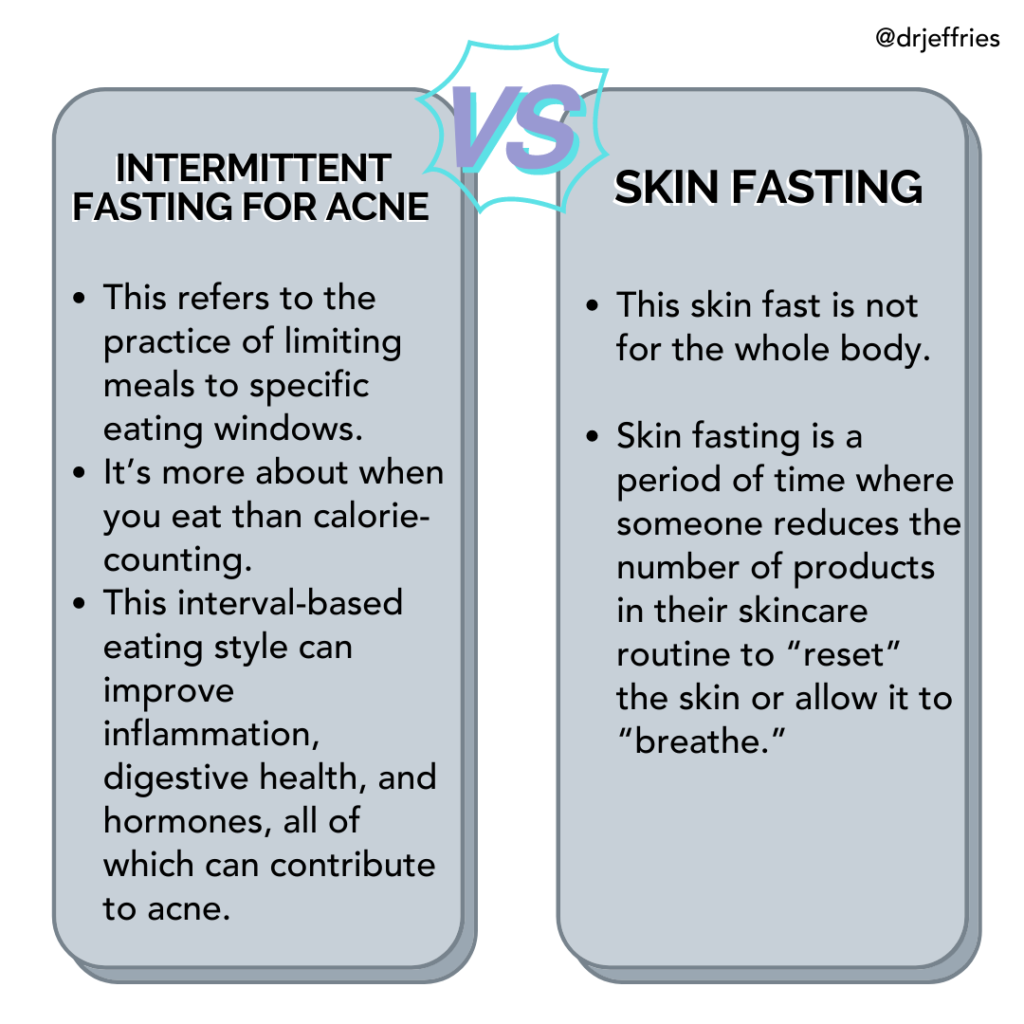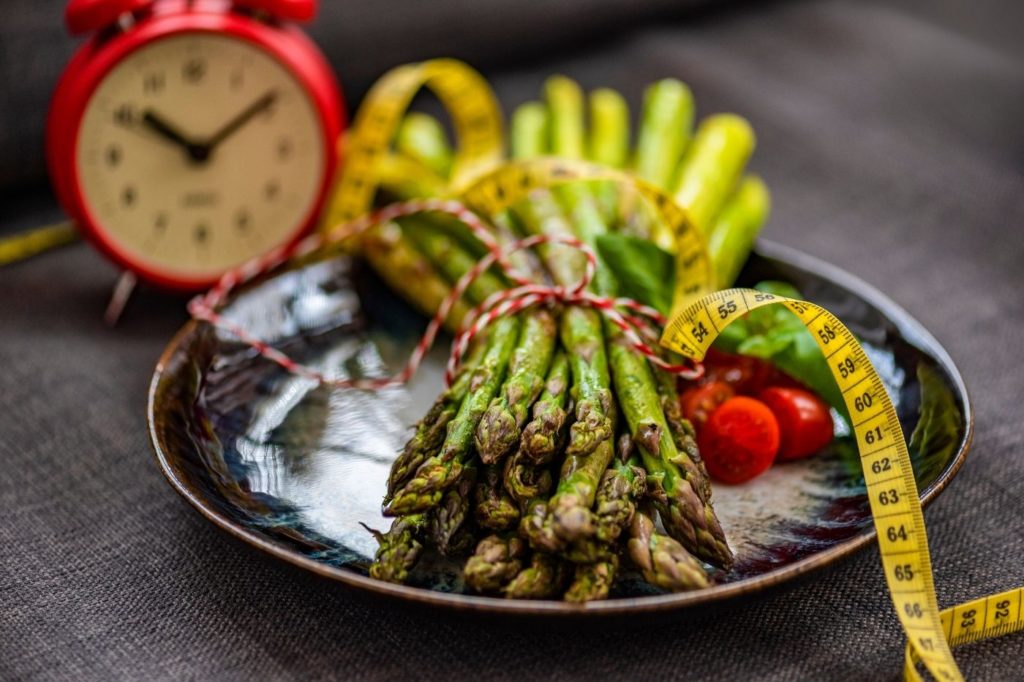
Intermittent fasting (IMF) has been all the rage for weight loss, but have you ever considered it for skin health?
As a dermatologist, I want to explain precisely how intermittent fasting benefits the skin, whether or not it works, and how to get started.
How Fasting Impacts Skin
Fasting is defined as a period of time going without food. Intermittent fasting, also referred to as IMF, is a dietary pattern during which you fast for anywhere between 12-72 hours at a time. Most people who practice IMF regularly fast for 12-18 hours per day on average.
Can fasting improve skin? Fasting can improve skin in many cases by treating root causes of acne.
No matter what method, fasting impacts the skin by inducing autophagy, sometimes called “cellular housekeeping.” In autophagy, the body has run out of external fuel sources and begins to recycle its own damaged proteins and cell fragments to create stronger, new cells.
Autophagy may help many aspects of the human body, potentially:
- Preventing disease
- Slowing aging
- Regulating responses to stress
- Supporting the immune system
- Improving skin conditions such as psoriasis
Does fasting clear up acne? Fasting may be able to clear up acne along with other skin issues. This is particularly true when intermittent fasting is paired with the skin’s innate clock. Autophagy for acne can often work to reduce the inflammation and other issues that lead to acne.

Does intermittent fasting cure acne?
The question you’ve been wondering: Can intermittent fasting clear your skin? Intermittent fasting can clear your skin, in some cases — but it’s not going to work for everyone in every situation.
Because there is no one underlying cause for acne, it’s impossible to claim that intermittent fasting alone can “cure” acne. However, the benefits of intermittent fasting impact many different acne triggers.
Can intermittent fasting cause skin problems? Intermittent fasting typically does not cause skin problems. There can be confusion when IMF is combined with keto, which may cause an acne-like rash.
Like traditional Chinese medicine, intermittent fasting may be a prescription-free natural way to cut down on pimples.
Benefits of Fasting
The health benefits of fasting can impact many systems in the body. Here are some of the top effects of fasting that can reduce acne and improve overall skin health.
Hormone Regulation
The hormone ghrelin may sound like a character from Lord of the Rings, but it’s actually the chemical in your gut that fights inflammation. Intermittent fasting can increase ghrelin levels (also called the hunger hormone), reducing inflammation in the digestive tract.
Low ghrelin levels are common in acne sufferers, so this is good news.
Another vital hormone, insulin, is profoundly affected by dieting with intermittent fasting. When fasting, blood sugar is regulated. Over time, this leads to reduced insulin sensitivity.
What’s more, insulin triggers the release of 3 more hormones: IGF-1, IL-1, and IGFBP-3. These trigger even more inflammation, clog pores, and produce too much sebum — all classic hormonal acne symptoms.
It’s encouraging to read studies that say intermittent fasting can increase insulin sensitivity, even without weight loss. That means less hormones roaming free through the body.
There’s an added bonus: chronically high insulin levels can cause damage to our collagen. That means intermittent fasting may improve skin tone and slow down the look of aging skin by regulating insulin levels.
Can fasting make you look younger? Fasting can make you look younger with its anti-acne and anti-aging benefits.
Reduced Inflammation
One of the best benefits of intermittent fasting is reduced inflammation. Fasting has been shown to reduce the proteins that trigger inflammation and help the body align to its own circadian rhythms.
Inflammation can be a significant cause of acne, rushing to defend clogged pores and making things worse in the process. Reducing it through intermittent fasting can change the pathology of your breakouts.
Microbiome Balance
Not only does fasting give your body the time it needs to process the nutrients you eat, but that resting time is helpful for the bacteria in the digestive system.
The time in autophagy also gives time to allow positive bacteria to replenish, allowing beneficial strains to flourish in the microbiome.
Balancing the gut can positively affect overall wellness, and fasting may help skin glow from the inside out.
Increased Sleep
Sleep deprivation can lead to low cortisol levels, a hormone we associate with stress. In turn, a lack of sleep is linked to insulin resistance, inflammation, and issues in the digestive system.
That’s a whole combination of acne-triggering factors. Thankfully, intermittent fasting has been shown to regulate many of these factors. In a study conducted on mice, changing the timing of a mouse’s meal had a significant effect on their sleep.
Intermittent fasting regulates our cortisol levels, balances circadian rhythms, and helps us get the sleep we need for our skin to repair itself.

Quick Start Guide to Intermittent Fasting for Acne
So, you want to say hello to autophagy and goodbye to zits. Here’s a quick start guide to intermittent fasting for acne:
- Choose a fasting schedule
- Eat the right foods
- Track your progress
1. Choose a Fasting Schedule
Your first step is to choose the fasting schedule that’s right for you.
Disclaimer: it’s always wise to discuss this significant shift with a healthcare professional before beginning a major eating overhaul.
Here are some of the most popular intermittent fasting schedules:
- 16/8 hour fasting: This is easy to remember, as you simply eat all meals within an 8-hour eating window after a 16-hour fast.
- 5/2 method: Eat normally 5 days a week, but restrict your caloric intake on the other two days. Women should eat no more than 500 calories, and men should consume no more than 600 calories on these 2 restricted days.
- Alternate-day fasting: Fasting, or drastically restricting calories, every other day is not a great choice for beginners. If you’ve fasted before, you might choose this method of skipping food on alternate days.
Your fasting method may also be informed by any other results you’re trying to achieve. Are you a middle-aged woman trying to lose body fat? Your schedule may be different than a teen with period pimple woes.
2. Eat the Right Foods
Watch for inflammation-inducing foods: Dairy, carbohydrates, and gluten are often sneaky contributors to acne. Be disciplined in what you eat, not just when.
Make sure you’re getting nutrient-dense, anti-inflammatory, acne-healing foods, including:
- Leafy greens
- Cruciferous veggies
- Berries (full of antioxidants)
- Avocados
- Lean proteins
- Carrots
- Sweet potatoes
- Salmon
You may also discuss a low-carb or Paleo diet with your healthcare provider or nutritionist. Eating well is a cornerstone of intermittent fasting.
3. Track Your Progress
Now, watch what happens as you reduce inflammation, balance hormones, increase sleep, and improve gut health. Notice what fasting method makes you feel best and when you see good results.
Remember, you can always tweak your fasting routine — listen to your body. You may want to keep a journal or photos of your skin before and after fasting. You’ll find a rhythm that works for you.
Be sure to hydrate to avoid dry skin from fasting. Also, watch for disruptions in your menstrual cycle or obsessing over your body image or weight loss. These can be warning signs that you are obsessing over your fasting routine.
For most people, intermittent fasting may clear skin while reducing body weight.

Intermittent Fasting for Acne vs. Skin Fasting: What’s the difference?
While fasting for skin may sound a whole lot like “skin fasting,” they are two very different concepts. Here’s the difference:
- Intermittent fasting for acne: This refers to the practice of limiting meals to specific eating windows. It’s more about when you eat than calorie-counting. This interval-based eating style can improve inflammation, digestive health, and hormones, all of which can contribute to acne.
- Skin fasting: This skin fast is not for the whole body. Skin fasting is a period of time where someone reduces the number of products in their skincare routine to “reset” the skin or allow it to “breathe.”
Should you try fasting for your skin?
Fasting affects your skin by reducing breakouts while treating their underlying causes. Autophagy during fasting helps the body to repair itself, rebalance, and fight inflammation.
If you’re not sure that fasting is right for you, talk to your doctor or dermatologist.
Sources
- Sedwick, C. (2012). Yoshinori Ohsumi: Autophagy from beginning to end. Full text: https://www.ncbi.nlm.nih.gov/pmc/articles/PMC3328387/
- Marx, V. (2015). Autophagy: eat thyself, sustain thyself. Nature methods, 12(12), 1121-1125. Full text: https://www.nature.com/articles/nmeth.3661.pdf?origin=ppub
- Bagherniya, M., Butler, A. E., Barreto, G. E., & Sahebkar, A. (2018). The effect of fasting or calorie restriction on autophagy induction: A review of the literature. Ageing research reviews, 47, 183-197. Abstract: https://pubmed.ncbi.nlm.nih.gov/30172870/
- Germic, N., Frangez, Z., Yousefi, S., & Simon, H. U. (2019). Regulation of the innate immune system by autophagy: neutrophils, eosinophils, mast cells, NK cells. Cell Death & Differentiation, 26(4), 703-714. Full text: https://www.nature.com/articles/s41418-019-0295-8
- Deretic, V., Kimura, T., Timmins, G., Moseley, P., Chauhan, S., & Mandell, M. (2015). Immunologic manifestations of autophagy. The Journal of clinical investigation, 125(1), 75-84. Abstract: https://pubmed.ncbi.nlm.nih.gov/25654553/
- Abdel Rahman, S., & El Esaway, F. (2019). Impact of low ghrelin level in patients with postadolescent acne. Journal of cosmetic dermatology, 18(6), 1907-1911. Abstract: https://pubmed.ncbi.nlm.nih.gov/30980595/
- Sutton, E. F., Beyl, R., Early, K. S., Cefalu, W. T., Ravussin, E., & Peterson, C. M. (2018). Early time-restricted feeding improves insulin sensitivity, blood pressure, and oxidative stress even without weight loss in men with prediabetes. Cell metabolism, 27(6), 1212-1221. Abstract: https://pubmed.ncbi.nlm.nih.gov/29754952/
- Aly, S. M. (2014). Role of intermittent fasting on improving health and reducing diseases. International journal of health sciences, 8(3). Full text: https://www.ncbi.nlm.nih.gov/pmc/articles/PMC4257368/
- Tanghetti, E. A. (2013). The role of inflammation in the pathology of acne. The Journal of clinical and aesthetic dermatology, 6(9), 27. Full text: https://www.ncbi.nlm.nih.gov/pmc/articles/PMC3780801/
- Catterson, J. H., Khericha, M., Dyson, M. C., Vincent, A. J., Callard, R., Haveron, S. M., … & Partridge, L. (2018). Short-term, intermittent fasting induces long-lasting gut health and TOR-independent lifespan extension. Current Biology, 28(11), 1714-1724. Full text: https://www.ncbi.nlm.nih.gov/pmc/articles/PMC5988561/
- Leproult, R., Copinschi, G., Buxton, O., & Van Cauter, E. (1997). Sleep loss results in an elevation of cortisol levels the next evening. Sleep, 20(10), 865-870. Abstract: https://pubmed.ncbi.nlm.nih.gov/9415946/
- Hatori, M., Vollmers, C., Zarrinpar, A., DiTacchio, L., Bushong, E. A., Gill, S., … & Panda, S. (2012). Time-restricted feeding without reducing caloric intake prevents metabolic diseases in mice fed a high-fat diet. Cell metabolism, 15(6), 848-860. Full text: https://www.ncbi.nlm.nih.gov/pmc/articles/PMC3491655/
- Longo, V. D., & Panda, S. (2016). Fasting, circadian rhythms, and time-restricted feeding in healthy lifespan. Cell metabolism, 23(6), 1048-1059. Full text: https://www.ncbi.nlm.nih.gov/pmc/articles/PMC5388543/

